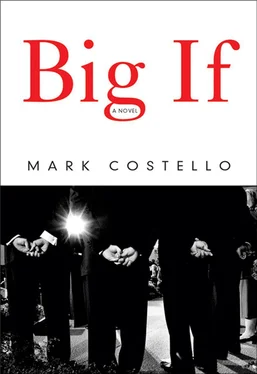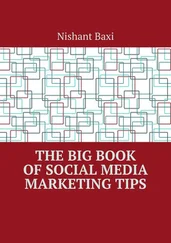Jens could see the women at the folding tables flipping through the multivolume voting rolls, A through E, F though L, M though XYZ. Voting was taking longer than Jens had expected. He was tempted to skip it, but he had already invested fifteen minutes in the line by then, and he was prepared to waste another fifteen minutes so that the first fifteen would not have been in vain.
The EMTs were standing by a curtained booth, trying to question the voter within. Jens saw a pair of Wallabees facing inward, away from the EMTs. All around, people gave their names, lined up for a booth, voted, had juice and cookies, or left right away. A priest joined the EMTs at the curtain and asked if he could help.
The line advanced. Jens gave his name to a woman who took names. The woman stamped his hand and he joined the nearest line. The priest and EMTs were standing at the center booth, talking to the Wallabees inside. The priest coaxed the old man out. Climbing on the gurney, the old man looked quite tired and relieved.
Food and drink were not allowed inside the booths, so Jens slipped the bottle of Glucola into the side pocket of his overcoat. He pulled the iron lever, closed the curtain with a clang. He stared at the options, the parties and the offices, the names in tiny type. He focused on his choice: the VP or the senator?
Peta had insisted that he vote (“Don’t bother coming home if you don’t vote,” she’d said, smiling, that morning), which was just another way in which they were different: Peta so rooted, so engaged, so strong for the VP (in poll code terms, a four); Jens undecided (poll code five). Jens had declared this status to the first pollster who had cold-called the condo in the spring. He had stuck to his position through a hundred calls and canvasses since then. It was easy in the spring to express no preference between candidates because there were no candidates back then. There were many candidates, mentioned, rumored, or projected, but none of them declared, senators, ex-senators, governors, single-issue mavericks with small, fervent followings, some of whom were also ex — unsuccessful candidates for president, drubbed in past New Hampshire primaries. Jens saw these men on the nightly news, winking, hinting, being coy, refusing to rule out. He also saw them (sometimes the next day) on the streets of Portsmouth, or shaking hands at Monsey’s Luncheonette, shirtless, tie loose, coat over the shoulder or held by an aide. Jens was prepared to shake the hand of any declared candidate, liberal, conservative, both parties. They shook his hand, sought his vote — it was honest and forthright. He wouldn’t shake the hands of any nondeclared candidates he happened to run across (he felt that a governor of Texas or a senator from Delaware ought to declare his reasons for hanging out at Monsey’s on a Saturday) — it was sneaky in a way, running undeclared. As the election neared and the field firmed up, pollsters called the house, pressing Jens: Would it change your opinion, sir, if you knew that the vice president was soft on the economy? Or: Would it make you any less undecided if I told you that the senator has voted to put a nuclear waste dump about four hundred feet from your house? This was called push polling, another sneaky tactic, campaign hirelings posing as true pollsters, spreading crummy information in their questions. Eventually Jens installed a voice-mail firewall to keep pollsters and fake pollsters at a distance, but this didn’t block the rest of the barrage, the canvas vans, the TV spots, the radio, the mailings, the flyers and lawn signs, the billboards and the bumper stickers in the corner of your eye a zillion times a day. Jens had clung to his non-opinion through summer, fall, the holidays, and he found it hard, standing in the booth, to cast his longdefended undecidedness aside. The VP or the senator? He finished the Glucola, gazing at the names.
Peta found it funny, Jens and his dilemma. She called it their mixed marriage. She said that fives should never marry fours, it only led to nines or ones. She was satirizing Jens’ indecision and his old programmer’s bad habit of seeing things in logical or numeric terms — people, feelings, tendencies pseudo-quantified as code, four, five, OFF, ON, IF/WHILE. Peta said that nothing but the gas bill could be quantified in numbers, that nothing was precisely this or that. Peta could accept the gray of how things are, and, because she could, her political opinions were ironically quite black-and-white, this is who I am, this is where I’m coming from, this is what I think. Jens, seeking black-and-white, never found it, and wound up lost in gray. He had tried to analyze the question algorithmically, comparing the two candidates’ positions on a number of issues, global warming, NATO, tax cuts, Russia, thinking that he would draw up a kind of tote board, his beliefs compared to their beliefs, with his vote going to the man who had the most checkmarks in his column when the process was completed. To do this, however, Jens first had to find out their positions, which turned out to be hard because their issue papers were vague and platitudinous. He also had to learn his own positions, which dragged the process out a lot. Russia, for example, was sprawling and chaotic, as a country and a subject. He stayed up late at the condo, trying to work on Monster Todd, failing in this effort, taking a quick break to cruise and study websites about Russia, the gangsters and decay, engrossing and disturbing, the short break from his monster often stretching toward the dawn.
When he shared his partial findings with Peta, she became exasperated, he became defensive, and sometimes they fought. Jens knew that they were really fighting about something deeper — their life as a whole, the work slump he was in, his problems at BigIf.
Jens stood in the voting booth: the VP or the senator? He was thinking about options. He had joined the game to make cool objects out of software, and, yes, for the money and the options, the chance to cash out young and return to pure research. He had built BigIf with Naubek and the others, and his options were waiting for the IPO, and everything was good, but was it what he wanted? He was undecided, a kind of cosmic five. On the one hand, there was Walter, so clearly disapproving in the months before his death. Jens had come to see his father’s point. BigIf was immoral or amoral — the sheer scale of the killing, the product tieins with the frequent-flier miles, and the sinister new monsters (Postal Worker, Todd), the ones who look like us. This was the case for quitting. On the other hand, Jens knew it made no sense to leave BigIf now, after all his work, with his options vested.
He pulled the iron lever in the voting booth. The curtains leapt apart and Jens walked out.
“Hello,” said Bradley Schwartz,“my name is Bradley Schwartz. I’m Naubek’s replacement. Are these workstations being used or can I just pick one?”
Jens looked up from a screen of e-mails. Bradley Schwartz was a young man in loose chinos and a blue polo shirt. His glasses were gold-rimmed, moderately round. His chinos were slightly darker than most chinos at BigIf, more a light brown than a beige. Otherwise he seemed quite normal.
“Two of them are free,” said Jens. “The rest are assigned. A few more may open up before the day is over. Naubek sat right here.”
“Thank you,” Bradley said. He sat at Naubek’s terminal and looked at the keyboard. “Has this thing been cleared for booby traps at all?”
“I don’t know,” said Jens. “I’m not sure who does that. E-mail Digby. Digby probably knows.”
“It’s just that I heard that Naubek was a hard case,” said Bradley Schwartz. “They say he’s holed up with a cache of weapons, an actual cache. Is he the sort of guy who would take it personally, me replacing him?”
Читать дальше












